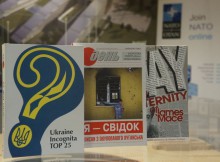Last week a meeting of the NATO foreign ministers took place in Brussels, to which Ukraine’s delegation led by Foreign Minister Pavlo Klimkin was also invited. Today NATO faces a number of acute and diverse challenges which boil down to, firstly, the necessity to use all levers for political settling of imminent conflicts and, secondly, radical transformation of the strategy of responding to challenges (adaptation plans). And challenges abound. The war in Syria, the expansion of the ISIS, Russian aggression, which manifests itself not only in the Kremlin’s belligerent rhetoric, but also in actual occupation of territories and hostilities in Ukraine, and even violation of NATO members’ airspace.
The last item became a moment of truth after Turkey’s adequate response to such an insolent act. Yet a question remains: what was Turkey’s role in the destruction of the Russian bomber, and what role did NATO play? Many observers remark that the Kremlin’s behavior, which has ventured such provocation multiple times before, seeks to demonstrate that the Alliance is no longer an effective defense system, and thus the containment factor is eroded. The act of Turkey’s air force put Putin in the hot seat. How should he respond to the obviously unexpected scenario, now that the entire world has seen that NATO is capable to strike back? The result was the Kremlin’s helpless reaction in the form of trade blockades, propagandist hysteria in the media, and painting Turkey black as the world’s boogeyman. Yet what about NATO? Are other countries capable of a response like Turkey’s? This remains a mystery shrouded in endless smooth official statements, reports, and comments.
An invitation extended to Montenegro with a view to joining the Alliance just weeks after the incident with the bomber has aggravated the situation. Maybe, it was in order to relax the tension that Jens Stoltenberg suggested holding a meeting with Russia, and even resuming Russia-NATO partnership.
It is hard to imagine military exercises at the training grounds in Yavoriv while Russia-NATO commission resumes its work. Meanwhile, official NATO comments state that there is no way the relationship with Moscow, existing prior to 2014, could be resumed. Certainly, political measures are necessary for the preservation of relative, however “bad,” peace and prevention of a “good,” large-scale war. Yet the question remains: won’t these political measures lead to giving up principles, in particular, turning a blind eye to the occupation of Ukrainian territories? There is a clear connection between violating a NATO member’s airspace and the abovementioned occupation, namely, the Kremlin’s undisguised ambitions to dominate in the eastern hemisphere, with a pronounced erosion of NATO’s importance.
For Ukraine the main question remains the same: our ability to conform to NATO standards, since many note that we do not get lethal weapons exactly because there is doubt as to which side it would fire. And secondly, to what extent NATO can back us in our battle against Russian aggression.
On Wednesday The Day’s representative met with Oana Lungescu, the spokesperson for the North Atlantic Alliance at the NATO headquarters and presented the publications from Den/The Day’s Library, namely Ukraine Incognita. TOP 25 with key articles on the history of Ukraine from Kyivan Rus’ to this day; Day and Eternity of James Mace, which tells the story of this prominent American researcher of the Holodomor, and I am an Eyewitness. Notes from the Occupied Luhansk, on the causes and reality of occupation in Donbas. Lungescu (who understands spoken Ukrainian, by the way) wished Den/The Day to keep covering events from the perspective of objective historical truth, which is necessary for understanding the roots of the problems our country is facing.









